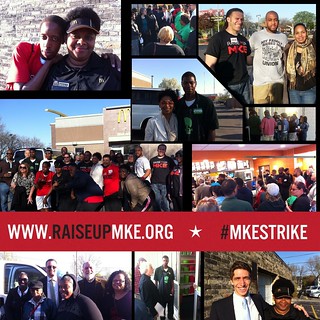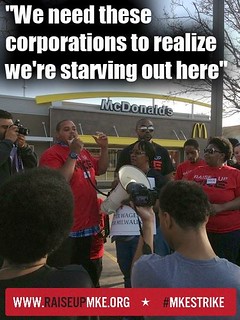It's official. Minimum wage workers going on strike is no longer a mere trend. It's a movement. Not that there was ever any doubt, after minimum wage workers in the fast food and retail sectors of major cities like New York City, Chicago, St.Louis, and Detroit walked off the job, demanding better wages and better treatment in the workplace.
Yesterday, the movement reached Wisconsin, where fast food workers in Milwaukee took to the streets to demand a $15 minimum wage. You can show your support by signing their petition.
Fast-food and retail workers walked off the job in Milwaukee, Wis., on Wednesday, prompting labor organizers to speak of "spreading unrest" in the service industry.
The strike followed similar one-day walkouts over the last two months in Detroit, Chicago, St. Louis, and New York, as well as a nationwide walkout by Walmart workers on Black Friday.
Like those who have gone on strike in other cities, the Milwaukee workers are demanding a "living wage" of $15 an hour and the right to form a union.
"I feel that I do so much work and get so little pay," said Stephanie Sanders, a 33-year-old McDonald's employee who earns the federal minimum wage of $7.25 an hour at the Milwaukee restaurant where she works.
Since the recession, low-paying work has comprised more than half the country's new jobs. Although many corporations are earning more than they did before the downturn, workers' wages have not improved. Fast-food and retail companies are among the nation's largest employers of low-wage workers.
Like Detroit, Milwaukee is reeling from the decline in American manufacturing, which has cost Milwaukee 100,00o jobs since the 1980s. And, as in Detroit, the loss of manufacturing jobs hit African Americans particularly hard.
“Milwaukee has a really special history particularly for African Americans,” said Jennifer Epps of the group Wisconsin Citizen Action, which helped organize the strikes. “We had the highest per capita income for black workers in the country, now we have one of the lowest.”
A report from the University of Milwaukee found that in 1970, over 54 percent of black men in the city were employed in factories, more than twice the percentage of whites. But, as Milwaukee’s Sentinel Journal reports, 100,000 jobs in Delco Electronics, Pabst Brewing Company and other factories left the city since 1980. By 2009, under 15 percent of black men held manufacturing these jobs, about equivalent to the percentage as white workers.
As these jobs disappeared, Milwaukee’s rate of black unemployment spiked. Before the recession, the city rivaled Buffalo, NY with the highest rates of black unemployment, according to a report from the University. And those who have found work are now far more likely to be relegated to non-union, minimum wage jobs. The Wisconsin Department of Workforce Development projects that food preparation and serving jobs, including those in fast food, will grow by 12 percent in the next decade, three times the rate of jobs overall.
Over 200 workers from fast food chains like McDonald's, Burger King, Taco Bell joined workers from retailers like TJ Maxx, Dollar Tree and FootAction joined the growing "McJobs" rebellion.
With the average Walmart salesperson making only $8.81 per hour, the six heirs to the Walmart fortune have pocketed about $100 billion in wealth - more than the least well-off 41 percent of Americans combined.
McDonald's raked in $5.5 billion in profits in 2012, while Yum! Brands, which includes KFC, Taco Bell, and Pizza Hut, took home $1.6 billion in profits.
With government failing to act and corporations succeeding in keeping out unions, the Robin-Hood-in-reverse economy - taking from workers to give to the rich - is steadily getting worse. A majority of jobs created in the economic recovery have been in low-wage industries. Unless pay levels are raised, seven out of 10 growth occupations over the next decade will be low-wage positions, according to the U.S. Bureau of Labor Statistics.
So what do participants in the Raise Up Milwaukee campaign, and their counterparts in other cities, want? A basic wage of $15 per hour, and the right to form unions without corporate interference and intimidation. They understand that big corporations in the service industries can afford to pay more, but that these companies won't do so unless workers join together and demand wages that support families. Like workers have through U.S. history, they are turning to unions to help solve a low-wage problem that is dragging our entire economy down.
Raises and the right to form unions would shift money back to working families for basic necessities, instead of sending it off to distant corporate headquarters to pad profits for executives and Wall Street stockholders. That shift, in turn, would help support small businesses and jobs in local communities.
Minimum wage workers in Wisconsin currently earn $7.25 an hour. Working 40 hours a week at that rate, a worker would earn about $15,080 a year — more than $400 below Wisconsin's poverty line for a family of two. Raising the minimum wage to $15 an hour would still fall short of a wage to support a family of two.
Workers earning $7.25 and working a consistent 40 hours a week earn $15,080 a year—over $400 under the Wisconsin poverty line for a family of two. While a $9 minimum wage would increase that annual income to $18,720, an increase to $15 would make it a full $31,200. That’s still barely three quarters of what’s needed to comfortably support one adult and one child in Wisconsin, according to the Massachusetts Institute of Technology’s Minimum Wage Calculator, but it would be a dramatic upgrade from current conditions.
It gets worse if you take wage theft into consideration. According to a new survey by Fast Food Forward, 84 percent of fast food workers in New York City have experienced various forms of wage theft in the past year.
- 36 percent report being forced to work while off the clock
- 32 percent of cashiers reported being required to pay their employers if their registers were short
- 30 percent report working more than 40 hours in a week without receiving time-and-a-half for overtime
- 46 percent report begin the victim of at least one illegal paycheck deduction, such as paying for meals not eaten or for company-required uniforms
- 30 percent report receiving their paychecks late, or having their paychecks bounce
Thus McDonald's, KFC, and Taco Bell are raking in billions in profits, while employees like 34-year-old Tessie Harrell, struggle to afford basic necessities, and have to rely on food stamps. If taxpayers are supplementing wages for the employees of corporations earning billions of dollars in profit (and paying little to no taxes themselves), maybe we need to start thinking of food stamps, etc., as a form of "corporate welfare."
Or we can join minimum wage workers in Milwaukee in demanding a $15 minimum wage, and the right to unionize.



